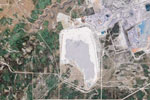View Larger Map
The tar sands as seen from Google Earth near Fort McMurray, Alberta.
In what can only be described as a major victory for green activists, the Obama Administration has announced it will delay a decision on TransCanada’s controversial Keystone XL pipeline for 12-18 months. Notably, putting the decision off until after the last election. The delay comes less than a week after about 12,000 people encircled the White House in opposition to the Keystone XL pipeline, which they argue threatens one of the most important water supplies in America’s heartland and will worsen climate change.
“A done deal has come spectacularly undone. The American people spoke loudly and today the President responded, at least in part,” said Bill McKibben, one of the major organizers of the fight against the pipeline. “Six months ago, almost no one outside the pipeline route even knew about Keystone XL. One month ago, a secret poll of ‘energy insiders’ by the National Journal found that ‘virtually all’ expected easy approval of the pipeline by year’s end. As late as last week the CBC reported that TransCanada was moving huge quantities of pipe across the border and seizing land by eminent domain, certain that its permit would be granted.”
McKibben, founder of climate action group 350.org, was one of 1,253 people arrested in civil disobedience acts against the pipeline in late summer.
 Protestors create human chain around White House. Photo by: Emma Cassidy. |
The Obama administration is said to be delaying the action to consider a different route for the pipeline. However, that won’t change grievances over the pipeline related to climate change. Bringing oil from Canada’s tar sands down to Texas refineries means expanding a fuel source to the global market that is more energy and water intensive than regular oil sources.
In terms of carbon emissions, Cambridge Energy Research Associates (CERA) estimated the greenhouse gas emissions of the tar sands was 5-15 percent higher than conventional sources, while the International Energy Agency (IEA) found that emissions were 20 percent higher. Others have given higher numbers. Climatologist, James Hansen, has stated that if the full-extent of the tar sands are exploited along with the world’s coal reserves ‘it is essentially game over’ for the climate. Delaying the pipeline, however, will put plans to expand the tar sands on ice for the time being, while TransCanada scrambles to find a way to bring tar sands oil to the world.
In Canada the exploitation of the tar sandsn has led to water pollution, political conflict with First Nations people, and large-scale deforestation in the Boreal. In addition, the rising emissions from exploiting the tar sands have forced Canada to back-off its climate goals.
However, proponents of the pipeline argue it would create jobs in the midst of a downturn and would allow the US a secure oil source from a friendly neighbor. Activists respond that it’s time to get off oil and move aggressively toward renewable energy.
“President Obama is making the right and tough decision. We hope he continues to consider climate, health and the impacts of extreme energy like tar sands on our land and water while creating a path to real energy independence. The bottom line is, when President Obama stands up to big oil, we stand with him,” said Jane Kleeb, founder of BOLD Nebraska, which led protests in the state.
McKibben adds that the delay will not make the pipeline easier to pass down the road, saying “we’re unequivocal in our opposition.”
Related articles
12,000 surround White House to protest tar sands pipeline

(11/07/2011) One year to the day before the 2012 US election, up to 12,000 activists encircled the White House to protest the Keystone XL pipeline, a proposed 1,700 mile pipeline that would carry oil from Canada’s infamous tar sands to the US and other foreign markets. Critics of the TransCanada pipeline have warned of potential spills in America’s heartland as well as the climate impacts of allowing more tar sands oil, which has a higher carbon footprint than conventional sources, into the US and other markets. The issue has galvanized climate and environmental activists in the US with the massive rally on Sunday preceded by civil disobedience actions in late summer that lead to the arrests of 1,253 people.
Tar sands pipeline ‘another dirty needle feeding America’s fossil fuel addiction’

(10/11/2011) Climate and environmental activism in the US received a shot of enthusiasm this summer when it focused unwaveringly on the Keystone XL Pipeline. During a two week protest in front of the White House, 1,253 activists—from young students to elder scientists, from religious leaders to indigenous people—embraced civil disobedience for their cause and got themselves arrested. Jamie Henn, spokesperson with Tar Sands Action, which organized the protests, and co-founder of climate organization 350.org, told mongabay.com that,”the reason the Keystone XL pipeline has emerged as such a key fight is because it is on a specific time horizon, the Administration says it will issue a decision by the end of this year, and the decision whether or not to grant the permit rests solely on President Obama’s desk. This is a clear test for the President.”
Keystone pipeline company hand-picked US government’s environmental assessor
(10/10/2011) A little over a month after 1,252 people were arrested in two weeks of civil action against the Keystone XL Pipeline, The New York Times has revealed that the Obama administration allowed a consulting firm with financial ties to the pipeline to conduct the project’s Environmental Impact Assessment (EIA). While it is not uncommon for government departments to ‘outsource’ EIAs, legal experts quoted in the piece expressed surprise that the State Department would select a firm so close to the company proposing the project.